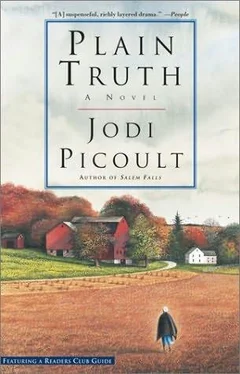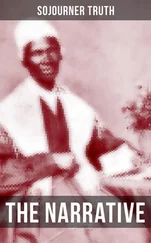Coop shrugged. “However, the baby died in her arms while she was passed out from exhaustion. She woke up, covered with blood from delivery and holding the dead newborn. In her mind, she blamed herself for the baby’s death: he had died because he wasn’t conceived in wedlock, within the Amish church.”
“Let me get this straight, Doctor. You don’t believe Katie killed her baby?”
“No, I don’t. Killing her own infant would have made it virtually impossible for Katie, in the long run, to be accepted back into the community. Although I’m no expert on pacifist societies, I think deliberately confessing to murder would most likely fall under that category. Since inclusion in the community was the foremost thought in her mind for the entire pregnancy, it was certainly with her at the moment of birth, as well. If she’d woken up to a live baby, I think she would have confessed to her sin in church, raised the baby with her parents, and gone on with her life. But as it was, that didn’t happen. I think that she woke up, saw the dead infant, and panicked-she was going to be shunned for an illegitimate birth, and she didn’t even have a child to sweeten that reproof. So her mind reflexively kicked into coping gear, and tried to remove the evidence that there had been either a birth or a death-in essence, so that there would be no reason to exclude her from her community.”
“Did she know she was hiding the body at the time she was doing it?”
“I assume Katie hid the baby’s body while she was still in a dissociative state, because to this day she doesn’t remember doing it. She can’t let herself remember, because it’s the only way she can live with her grief and her shame.”
That was the point at which Coop and I had planned to cut off the direct examination. But suddenly, on a hunch, I crossed my arms. “Did she ever tell you what happened to the baby?”
“No,” Coop said guardedly.
“So this whole scenario-the baby’s death and Katie’s sleepwalking stint to hide the body-that’s something you came up with entirely on your own.”
Coop blinked at me, confused, and with good reason. “Well . . . not entirely. I based my conclusions on my conversations with Katie.”
“Yeah, okay,” I said dismissively. “But since she didn’t actually tell you what happened that night, isn’t it possible that Katie murdered her baby in cold blood, and stuck it in the tack room afterward?”
I was leading, but I knew that George wouldn’t have objected if his life depended on it. Coop sputtered, utterly confused. “Possible is a very big word,” he said slowly. “If you’re talking about the feasibility of certain-”
“Just answer the question, Dr. Cooper.”
“Yes. It’s possible. But not probable.”
“Is it possible that Katie gave birth, held her baby boy, swaddled her baby boy, and cried after discovering it had died in her arms?”
“Yes,” Coop said. “Now, that’s probable.”
“Is it possible that Katie fell asleep holding her live infant, and that a stranger came into the barn and smothered it, and hid it while she was unconscious?”
“Sure, it’s possible. Unlikely, but possible.”
“Can you say for certain that Katie did not kill her baby?”
He hesitated. “No.”
“Can you say for certain that Katie did kill her baby?”
“No.”
“Would it be fair to say that you have doubts about what happened that night?”
“Yes. Don’t we all?”
I smiled at him. “Nothing further.”
• • •
“Correct me if I’m wrong, Dr. Cooper, but the defendant never actually said that her baby died of natural causes, right?”
Coop stared down the prosecutor, God bless him. “No, but she never said she murdered him either.”
George considered this. “And yet, you seem to think that’s highly improbable.”
“If you knew Katie, you would, too.”
“By your own testimony, the foremost thought in Katie’s mind was acceptance by her community.”
“Yes.”
“A murderer would be shunned by the Amish community-maybe even forever?”
“That’s my assumption.”
“Well, then, if the defendant killed her baby, wouldn’t it make sense for her to hide the evidence of the murder so that she wouldn’t be excommunicated forever?”
“Gosh, I used to do this in seventh-grade math. If x, then y. If not x, then not y.”
“Dr. Cooper,” George pressed.
“Well, I only brought it up because if the if part of that statement is false, the then part doesn’t work either. Which is just a roundabout way of saying that Katie really couldn’t have murdered her baby. That’s a conscious act, with conscious reactive actions-and she was in a dissociative state at that point.”
“According to your theory, she dissociated when she gave birth-and was dissociating when she hid the body-but managed to be conscious and mentally present enough to understand that the baby had died of natural causes in the few minutes in between?”
Coop’s face froze. “Well,” he said, recovering, “not quite. There’s a distinction between knowing what’s happening, and understanding it. It’s possible that she was dissociating during the entire sequence.”
“If she was dissociating when she realized the baby had died in her arms, as you suggest, then she was not really aware of what was happening?”
Coop nodded. “That’s right.”
“Then why would she have felt such overwhelming grief and shame?”
He had Coop up against a tree, and we all knew it. “Katie employed a variety of defense mechanisms to get through the birth. Any of these might have been at work at the moment she realized the infant had died.”
“How convenient,” George commented.
“Objection!” I called out.
“Sustained.”
“Doctor, you said that the first thing Katie recalled about the birth was that she didn’t want to get blood on the sheets, so she headed to the barn to give birth?”
“Yes.”
“She didn’t recall the baby itself.”
“The baby came after the labor, Mr. Callahan.”
The prosecutor smiled. “So my dad told me forty years ago. What I meant was that the defendant did not recall holding the baby, or bonding with it, isn’t that right?”
“All that would happen after the birth. After the dissociation,” Coop said.
“Well, then, it seems awfully callous to be worrying about your sheets when you’re apparently enraptured with the idea of having a child.”
“She wasn’t enraptured at the time. She was terrified, and dissociating.”
“So she wasn’t acting like herself?” George prodded.
“Exactly.”
“One might even say, then, that it was like the defendant’s body was there, giving birth, feeling pain, although her mind was elsewhere?”
“Correct. You can function mechanically, even in a dissociative state.”
George nodded. “Isn’t it possible that the part of Katie Fisher that was physically present and mechanically able to give birth and cut the cord might also have been physically present and mechanically able to kill the baby?”
Coop was silent for a moment. “There are a number of possibilities.”
“I’m gonna take that as a yes.” George started to walk back to the prosecution’s table. “Oh, one final question. How long have you known Ms. Hathaway?”
I was on my feet before I even realized I had been rising. “Objection!” I yelled. “Relevance? Foundation?”
Surely everyone could see how red my face had become. A hush had fallen over the courtroom. On the stand, Coop looked like he wanted to sink through the floor.
Judge Ledbetter squinted at me. “Approach,” she said. “What does this have to do with anything, Mr. Callahan?”
Читать дальше












